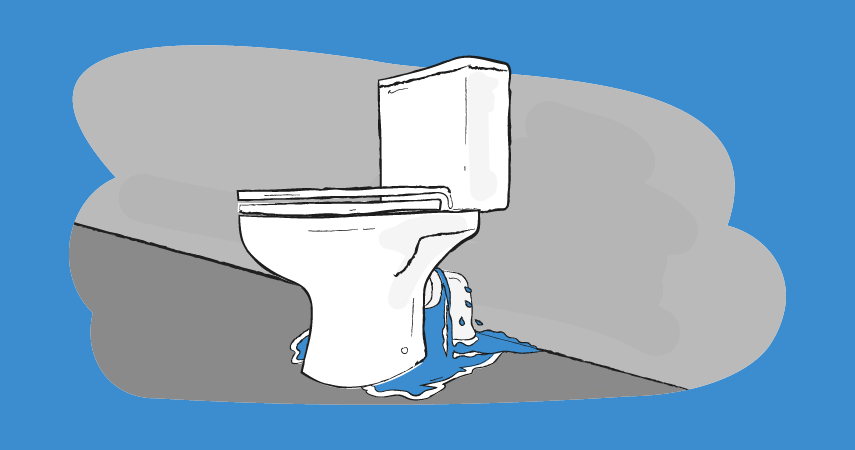Can a Landlord Leave a Tenant Without a Toilet?

If the toilet in your rental property is broken and it’s the tenant’s fault, they may be liable to pay, but it can still be the landlord’s responsibility to get it fixed.
Is a landlord responsible for a broken toilet?
Yes, in most cases a landlord is responsible for repairing a broken toilet. Under Section 11 of the Landlord and Tenant Act 1985, landlords are required to maintain installed appliances and fixtures in a rental property, including water, gas, electricity, and sanitation facilities such as toilets, sinks, basins, and baths.”
A toilet is an essential part of any home, so if it stops working, it should be fixed quickly, especially if it’s the only one in the property. If repairs are delayed, it could lead to issues like overflowing water, damage to the bathroom, or leaks into other rooms. In more serious cases, the property could even become unfit to live in until repairs are made.
How long can a landlord leave a tenant without a working toilet?
A toilet is classed as an urgent repair under the Landlord and Tenant Act 1985, which means landlords should arrange for it to be fixed as soon as possible. There’s no set number of days outlined in the regulations, but because a toilet is an essential facility, it shouldn’t be left out of action for long.
If there’s only one toilet in the property, it’s even more important to fix it as soon as possible. Leaving tenants without one can make the home uninhabitable, and landlords may have to provide temporary accommodation if repairs can’t be organised quickly.
Who is responsible for a toilet in a rented property?
In most cases, the landlord is responsible for repairing a toilet. If it stops working because of age or normal wear and tear, the landlord should arrange and pay for the repair or replacement.
If the toilet is damaged because of misuse, the tenant may have to cover the cost, for example if something is flushed that causes a blockage. However, the landlord usually arranges for a plumber and then gives the bill to the tenant.
Is it illegal to be left without a working toilet?
Yes, it can be illegal for a landlord to leave a tenant without a working toilet. The law makes toilets a priority because they’re essential for daily life. Just like employers have to provide toilets for staff at work, landlords should make sure tenants have them at home.
Under the Landlord and Tenant Act 1985, landlords must make sure the property has working sanitation facilities. Without them, the home may be classed as unfit to live in. If a landlord refuses to fix the problem, tenants can report it to the local council, and environmental health officers may then step in to make sure the repair is carried out.
Can a landlord refuse to repair the toilet?
If a landlord ignores the problem or delays repairs for too long, tenants can take action.
As a landlord, you should be given a reasonable amount of time to respond to your tenant and arrange repairs. If nothing is organised, tenants may contact their local, local council’s environmental health team. They can inspect the property and take action if they think the issue could cause harm to your tenants or others.
In serious cases, tenants might also be able to make a housing disrepair claim if the issue isn’t fixed, where the court can then order the landlord to carry out repairs. Sometimes, tenants can also claim compensation if the problem has affected their health or living conditions.
When should a landlord replace a bathroom?
There’s no legal rule on how often a bathroom must be replaced. However, one property professional suggests considering a new bathroom every 7–10 years, depending on usage and the level of wear and tear.
Signs that it may need replacing include:
- Frequent leaks or plumbing problems
- Fixtures and fittings that are worn or damaged
- Persistent drainage issues or blockages
- Mould, damp, or water damage that keeps coming back
- Broken ventilation or safety concerns with fittings
What is the tenant’s responsibility for bathroom repairs?
Tenants are expected to take reasonable care of the bathroom while they live in the property. This includes keeping it clean and hygienic, and using the facilities in the right way.
Tenants shouldn’t cause damage through misuse, like flushing things that might block the toilet or letting damp and mould build up because the room isn’t ventilated.
It’s also important that tenants let their landlord know quickly if something goes wrong, to make sure repairs are dealt with swiftly before problems get worse.
Who pays for broken toilet bowls and sinks in rental properties?
Toilet bowls and sinks are fixtures and fittings, so replacing them can be costly and disruptive. Usually, the landlord covers the cost of repairs or replacement, and some may choose to make a claim on their landlord insurance policy.
If the damage has clearly been caused by a tenant through carelessness or misuse, the landlord can recharge the cost to them.
Policy limits and exclusions may apply. Please see the policy wording for full terms and conditions
Why choose Just Landlords?
Choosing a suitable insurance provider can make a big difference when you’re letting out a property. Here’s why many landlords turn to Just Landlords:
- Rated Excellent on Trustpilot*, with over 1,000 reviews
- Over 25 years of experience providing landlord insurance
- An in-house customer service and claims team based in Nottingham
- Friendly support available by phone, LiveChat, or email
- 40 covers included as standard in our landlord insurance policy
*Correct as at October 2025.
FAQ
Below are some frequently asked questions about legal responsibilities for tenants and landlords. These are for general guidance only and shouldn’t be relied upon as a substitute for policy wording. For full details or advice specific to your situation, please contact Just Landlords.
What is the Landlord and Tenant Act 1985?
The Landlord and Tenant Act 1985 is a UK law that sets out the main rights and responsibilities of landlords and tenants, including who is responsible for repairs.
What is the law regarding toilets in the UK for landlords?
Under the Landlord and Tenant Act 1985, landlords are responsible for maintaining key sanitation facilities, which includes making sure the property has a working toilet.
How quickly should a landlord fix a toilet?
The Landlord and Tenant Act 1985, doesn’t give a specific time frame, but toilets are considered urgent repairs, so they should be fixed as soon as possible. If the problem isn’t fixed within a reasonable timeframe, tenants may need to contact the local council or seek further advice.
Who is responsible for a blocked toilet?
Responsibility depends on how the blockage happened. If it’s due to normal use or wear and tear, the landlord is usually responsible. If it’s caused by misuse, such as flushing items that shouldn’t go down the toilet, the tenant may have to cover the cost.
The sole purpose of this article is to provide guidance on the issues covered. This article is not intended to give legal advice, and, accordingly, it should not be relied upon. It should not be regarded as a comprehensive statement of the law and/or market practice in this area. We make no claims as to the completeness or accuracy of the information contained herein or in the links which were live at the date of publication. You should not act upon (or should refrain from acting upon) information in this publication without first seeking specific legal and/or specialist advice. Arthur J. Gallagher Insurance Brokers Limited trading as Just Landlords accepts no liability for any inaccuracy, omission or mistake in this publication, nor will we be responsible for any loss which may be suffered as a result of any person relying on the information contained herein.




